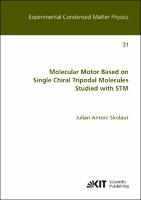Molecular Motor Based on Single Chiral Tripodal Molecules Studied with STM
Dissertations in Series (Dissertationen in Schriftenreihe)
| dc.contributor.author | Skolaut, Julian | |
| dc.date.accessioned | 2023-09-26T15:20:22Z | |
| dc.date.available | 2023-09-26T15:20:22Z | |
| dc.date.issued | 2023 | |
| dc.identifier | ONIX_20230926_9783731512479_4 | |
| dc.identifier | OCN: 1404956477 | |
| dc.identifier.issn | 2191-9925 | |
| dc.identifier.uri | https://library.oapen.org/handle/20.500.12657/76433 | |
| dc.description.abstract | This work presents a single molecular motor driven by the current in an STM. Its chiral functional group is supposed to perform a rotation in a preferred direction, proven by Binomial tests to be statistically significant. The rotation is proposedly driven by the chiral-induced spin selectivity effect (CISS). However, the studies of the rotation on the dependence on the lateral tip position, voltage and current indicate that he CISS is unlikely to cause the preferred rotation direction. | |
| dc.language | English | |
| dc.relation.ispartofseries | Experimental Condensed Matter Physics | |
| dc.subject.other | Nano Machines | |
| dc.subject.other | Molecular Motors | |
| dc.subject.other | Conductive Atomic Force Microscopy | |
| dc.subject.other | Molecular Electronics | |
| dc.subject.other | Nanomaschinen | |
| dc.subject.other | Molekulare Motoren | |
| dc.subject.other | Leitfähige Rasterkraftmikroskopie | |
| dc.subject.other | Molekulare Elektronik | |
| dc.subject.other | Scanning Tunneling Microscopy | |
| dc.subject.other | Rastertunnelmikroskopie | |
| dc.title | Molecular Motor Based on Single Chiral Tripodal Molecules Studied with STM | |
| dc.type | book | |
| oapen.identifier.doi | 10.5445/KSP/1000151650 | |
| oapen.relation.isPublishedBy | 44e29711-8d53-496b-85cc-3d10c9469be9 | |
| oapen.relation.isbn | 9783731512479 | |
| oapen.imprint | KIT Scientific Publishing | |
| oapen.series.number | 4 | |
| oapen.pages | 166 | |
| oapen.place.publication | Karlsruhe | |
| peerreview.anonymity | All identities known | |
| peerreview.id | 51a542ec-eaeb-47c2-861d-6022e981a97a | |
| peerreview.open.review | No | |
| peerreview.publish.responsibility | Books or series editor | |
| peerreview.review.stage | Pre-publication | |
| peerreview.review.type | Full text | |
| peerreview.reviewer.type | Editorial board member | |
| peerreview.reviewer.type | External peer reviewer | |
| peerreview.title | Dissertations in Series (Dissertationen in Schriftenreihe) |

